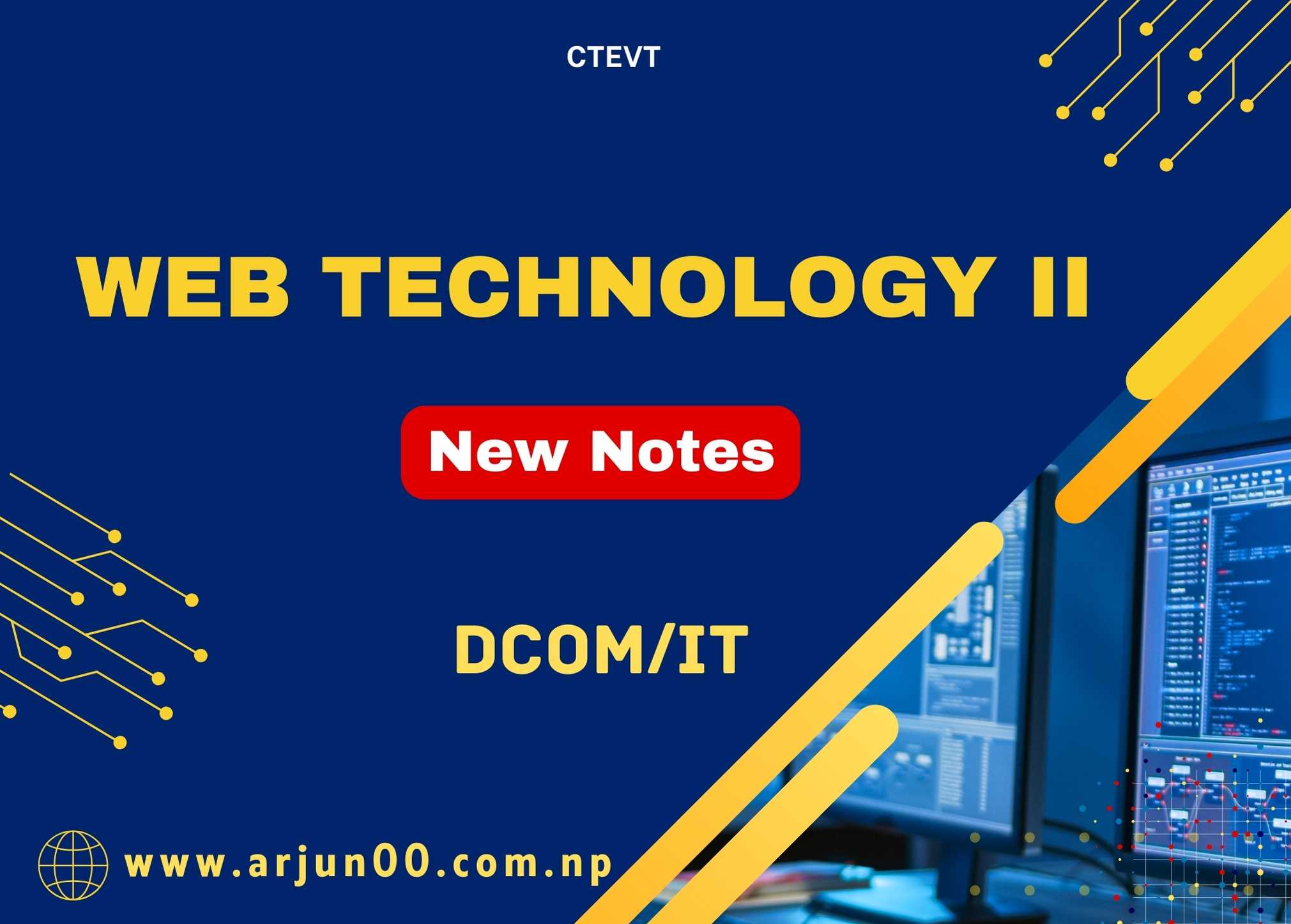**Info:
This PDF is only shared for educational purposes to help your studies. If you have any Problem or suggestions/feedback than please email us at info@arjun00.com.np.
New Notes 1
New Notes 2
Web Technology II :- Notes of Fourth Semester - DCOM/IT ,Diploma in computer / Information Technology Engineering, 4th sem, CTEVT , Diploma notes, Web Technology II diploma notes , new course notes,
Web Technology II
EG2205CT
Year: II Total: 7 hours
/week
Part: II Lecture: 3 hours/week
Tutorial: 1 hour/week
Practical: hours/week
Lab:
3 hours/week
Course description:
The purpose of this course is to introduce the concepts of Web Technology
using PHP programming including
introduction, basic structure, classes and objects, inheritance and exception
handling. This course also helps to implement
database connectivity and manipulation, XML, AJAX and PHP framework. At the end, students will be able to design
and develop dynamic web contents and applications.
Course objectives:
After completion of this course students will be able to:
1. Implement PHP for the basic of server-side
scripting language
2.
Apply PHP and MySQL for the fundamentals of database, database design
and their uses in web programming
3. Use XML, AJAX and Content Management Systems
|
Course
Unit 1. |
Contents: Theory Web Server
Concept |
[5 Hrs.] |
|
|
1.1. |
Introduction to Web Server |
|
|
|
1.2. |
Architecture of web server |
|
|
|
1.3. |
Concept
of Dynamic Content |
|
|
|
1.4. |
Using control flow to control dynamic content generation |
|
|
|
1.5. |
Concept of Architecting Web Application |
|
|
|
Unit 2. |
Review of Database: MySQL |
[4 Hrs.] |
|
|
2.1. |
Introduction to MySQL |
|
|
|
2.2. |
MySQL queries |
|
|
|
2.2.1. |
Create |
||
|
2.2.2. |
Insert |
||
|
2.2.3. |
Select |
||
|
2.2.4. |
Update |
||
|
2.2.5. |
Delete |
||
|
2.2.6. |
Alter |
||
2.3. Database
Normalization
Unit 3. Server-Side Script: PHP [12 Hrs.]
3.1.
Introduction of PHP
3.2.
Advantage of using PHP for web development
3.3.
PHP Installation
3.4.
PHP Syntax
3.5.
Comments, Variable, Operators, Datatype, Strings, Keywords
3.6.
Conditional Statements
3.7.
Loop
3.8.
Arrays
3.9.
Functions
3.10. Passing variables with data between
pages
3.10.1. Get & Post Method
3.10.2. Cookies
3.10.3. Sessions
3.11. File Upload: Date,
Include, File, File Upload
3.12. Accessing Form Elements, Form Validation
3.13. Exception and Error Handling
Unit 4. Object oriented concept and Database Connectivity [8 Hrs.]
4.1.
Classes and Objects
4.2.
Access Modifiers
4.3.
Constructors and Destructors
4.4.
Inheritance and Scope
4.5.
Overwriting Methods
4.6.
Database Connectivity
4.6.1. Creating database
with Server-Side Script
4.6.2. Connecting Server-Side Script to Database
4.6.3. Multiple Connections
4.6.4. Making queries
4.6.5. Building in Error
Checking
4.6.6. Fetching Data sets
4.6.7. Displaying Queries
in tables
4.6.8. Building Forms
and control form data using queries
Unit 5. AJAX and eXtensible Markup Language (XML) [8 Hrs.]
5.1.
Basic concept of AJAX
5.2.
Features of XML
5.3.
Structure of XML: Logical Structure, Physical Structure
5.4.
Naming Rules
5.5.
XML Elements
5.6.
XML Attributes
5.7.
Element Content Models: Element Sequences i.e., <!ELEMENT counting
(first, second, third, fourth)>,
Element Choices <!ELEMENT choose (this.one | that.one)>, Combined
Sequences and Choices
5.8.
Element Occurrence Indicators: -Discussion of Three Occurrence
Indicators? (Question Mark) * (Asterisk
Sign) + (Plus Sign)
5.9.
XML schema languages: Document Type Definition (DTD), XML Schema Definition (XSD)
5.10. XML Style Sheets (XSLT)
Unit 6. PHP Framework [8 Hrs.]
6.1.
Introduction
6.2.
Features
6.3.
Basic DB &
Client-Side Validation
6.4.
Session & Email
System
6.5.
Framework with method,
Classes and Cookies
Practical: [45 Hrs.]
1.
Installing required software
and platforms for local servers and scripting
(IDE, XAMPP, WAMPP, LAMPP etc.)
2. Simple programs
using;
2.1 Control and loops
2.2 Strings
2.3 Arrays
2.4 Functions
3. Passing Information between pages
4. Forms handling, validation etc.
5. Writing to file, reading from file and file upload
6. Examples of sessions and cookies
7.
Connecting to database
8.
Using various queries
on database to extract, insert,
update and delete from the web interface
9. Using XML markup elements and its attributes
10. Concept of using
simple AJAX in webpage
11. Design and develop a dynamic web page which should include database
|
Final written exam
evaluation scheme |
|||
|
Unit |
Title |
Hours |
Marks Distribution* |
|
1 |
Web Server Concept |
5 |
10 |
|
2 |
Review of
database: MySQL |
4 |
8 |
|
3 |
Server-Side Script:
PHP |
12 |
20 |
|
4 |
Object oriented concept and Database Connectivity |
8 |
14 |
|
5 |
AJAX and eXtensible Markup Language
(XML) |
8 |
14 |
|
6 |
PHP Web Design
Framework |
8 |
14 |
|
|
Total |
45 |
80 |
* There may be minor
deviation in marks distribution.
References:
1.
Bayross “Web Enabled Commercial
Application Development Using HTML, DHTML,
JavaScript, PHPI” BPB Publication
2. Hornberger Allen, “Mastering in PHP”,
BPB Publication
3.
Converse and Park with Morgan “PHP MYSQL
Bible” WILEY Publication
4. Sybex “ASP, ADO and XML Complete” BPB Publication
5. Russell “Mastering Active
Server Pages “(BPB)





No comments:
Post a Comment